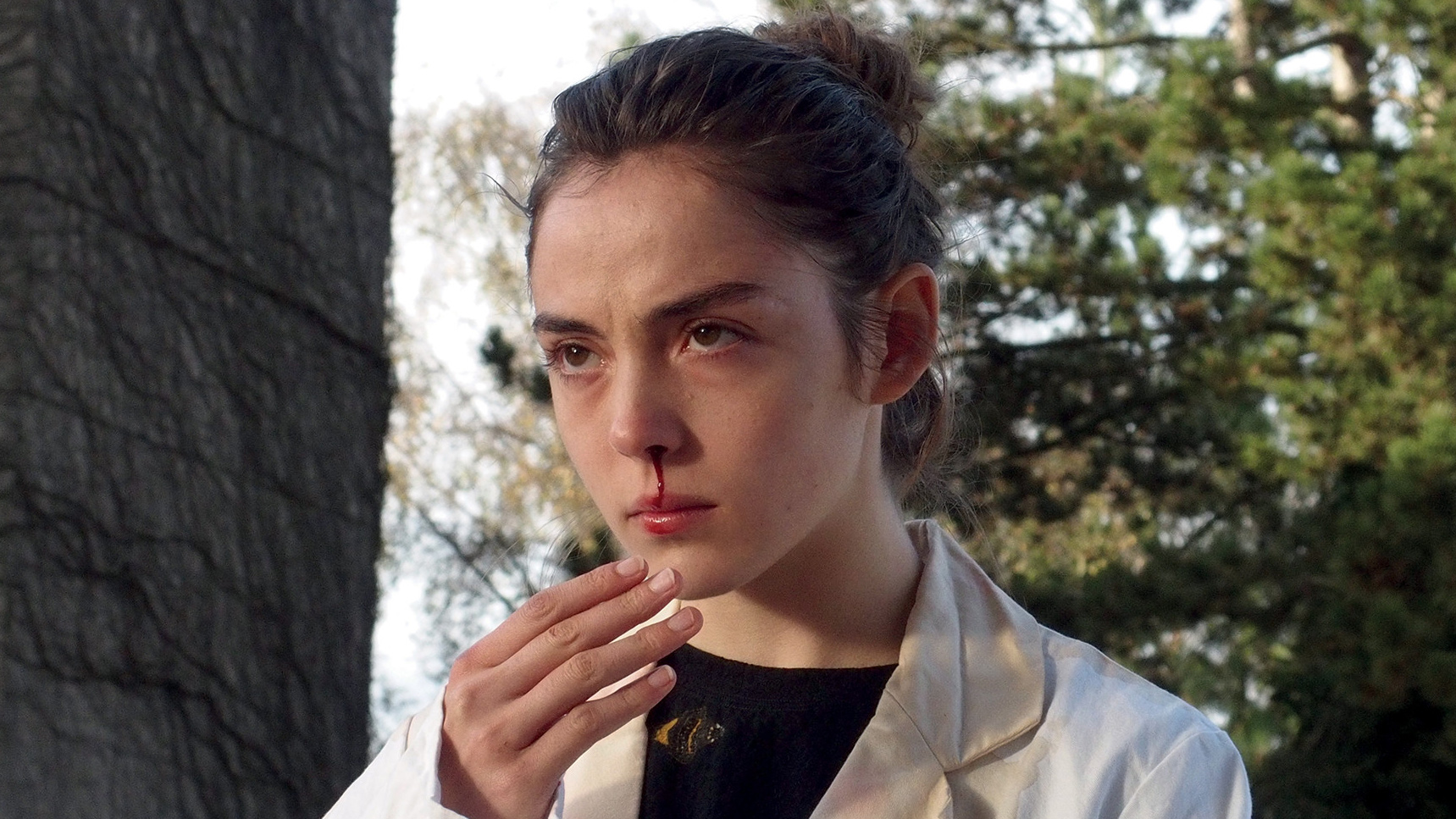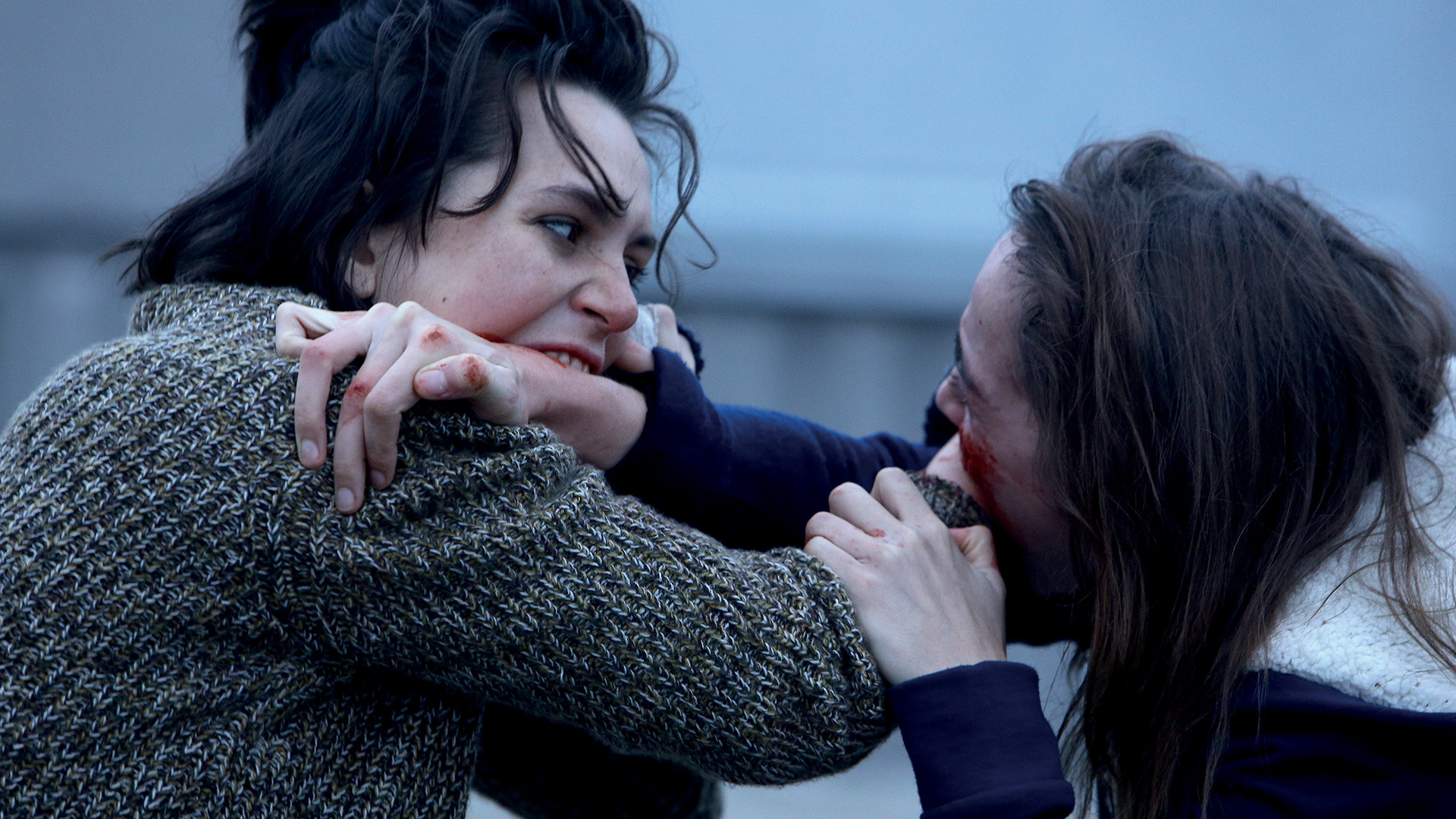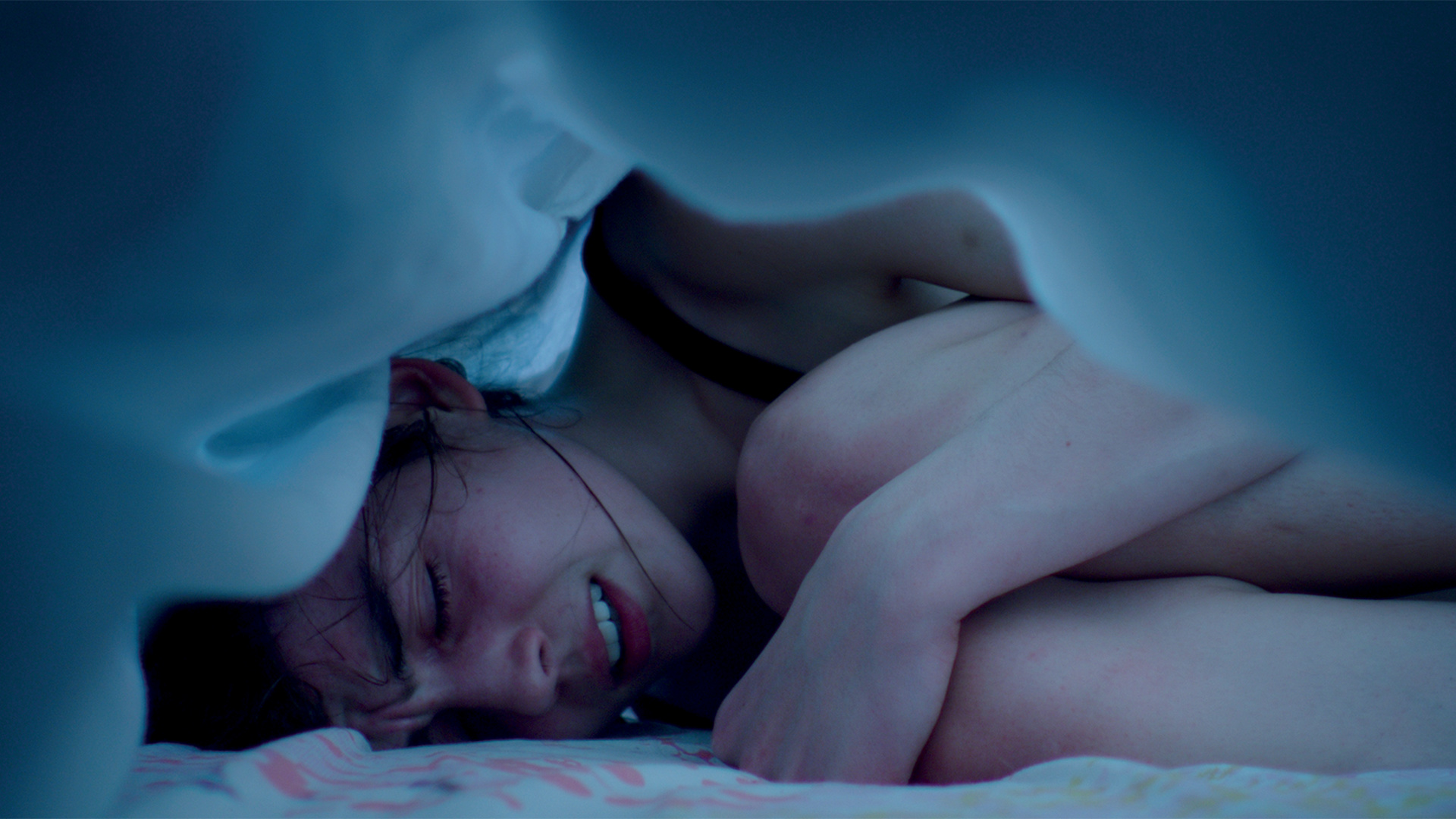Raw is a coming-of-age drama that just happens to be about cannibalism

*Spoilers ahead for Raw. No seriously, the first line is a spoiler. If you haven’t seen the movie and don’t want to know more, go and maybe read about the horror movies and TV still to come in 2017 Otherwise, continue after the gif*
There is a scene in Julia Ducournau’s Raw where a girl chews on her sister’s recently removed finger. She gnaws on it like you or I would a chicken wing; biting into the meat and stripping it of its skin. In the background, a dog sniffs around her bleeding sibling who lies in a dead faint from the shock of the accidental digit removal during an attempted bikini wax. It’s one of the funniest and most glorious scenes in the movie. A turning point where a young vegetarian grasps a new destiny with bloodied hands and you can’t help but laugh. Incidentally, this is the sequence that apparently sent film festival audiences keeling over in the aisles. Ambulances were called to cinemas where poor innocent critics were lying in pools of vomit. Maybe they missed the sense of humour memo?
Raw is somewhat bloody. I’m not here to tell you it’s not. Justine’s beautiful transformation from vegetarian to full meat-osaurus gently oozes with gore, controversial imagery and the kind of body horror that makes you feel like it might be part of you and you have to look down to check you’re all in one juicy piece. But this is no Hostel. No Saw. No Martyrs. This isn’t slicing up the human body for cinematic pleasure, it’s a far more ethereal coming-of-age drama that just happens to be about cannibalism. Justine has left home for the first time. She’s arrived at the veterinary college her sister already attends, having previously escaped the wrath of their fiercely anti-meat eating parents. It’s when she attends the hazing ritual for the young vets, amongst the bodies of the animals splayed for scientific dissection and the traditional power plays for student dominance, that she eats a tiny piece of mysterious flesh that changes her hunger for something with a little more texture than tofu. Yum.
French director Julia Ducournau wanted Raw to be everything. A delicious bloodied combo of genres. This is growing up, just not in the traditional sense. “It was important that my movie was a crossover, and it’s a crossover between a comedy, drama and body horror,” she explains. “It’s all the more important because in France we don’t have that culture of crossover, and it’s something that I had to fight for a lot because not having a definite identity raised a lot of questions. For me, it was very important that it was the identity of my movie because my movie is a lot about the way you can escape determinism and the way you can build up a skin that is your own. In spite of what family tells you, society tells you – about what you tell yourself that you believe that you are. So it was important for me somehow that the format of my movie reflects that as well. I really love movies that make me feel a lot of different emotions that I don’t see coming and that in the end I feel super full and alive and I really wanted to convey that, and I think you can only convey that by mixing genres and finding the balance between these genres.”
And she finds it. For all the fanfare, Raw is remarkably understated as a horror movie. Instead of using the nasty to disengage you from Justine, it just brings you closer to her. Whether we feel her pain as she has all her furniture tossed from her room as part of yet another hazing ritual, or despair while she literally chows down on her sibling’s flesh, there’s always a connection, no matter how unlikely. This is no accident. Once again horror takes a back seat to laughter and drama. “I do believe that, in movies, once a character has made you laugh with him or her, and not at him or her but with, it really creates a bond between you and that character that lasts through the whole movie,” says Ducournau. “So I really, really believe that pretty much someone who has made me laugh at the beginning has my empathy pretty much until the end, you know? No matter what he or she does, so that was a bit part in it, the comedy. I do believe that there is no laughter without drama, because drama gives depth and perspective to laughter, it’s not just giggling. It gives something that is a bit gut-wrenching as well so you know why you’re laughing. You laugh because you’re at the edge of a cliff somehow.”

Raw’s charm comes entirely from its leads. A frankly unlikely sentence in a movie that sees a girl eating a raw chicken breast from the fridge in the middle of the night. Justine and her sister Alexia have an incredible love/hate relationship. The older bold, brash Alexia is simultaneously exasperated by her sister but constantly looks after her. It’s the chaotic rivalry you have with your own flesh and blood but this pair just happen to share a little more of that than you might expect. It’s here that Ducournau challenges the idea of the way we see the human body. Keen to show that the way that we interact with our siblings is entirely different, she asked actor Ella Rumpf who plays Alexia to treat Justine as she would her own body. “At the beginning of the shooting I told her ‘You see Garance’s body as your body. You don’t ask permission to touch it, to grab it, to push it, to sit it, to put it at the door, to rush her outside of her room and stuff – you don’t ask permission. It’s like a pair of jeans, it’s just like yours. It belongs to you,’” she explains. “And I do believe that there is something like this in this bond because it’s a bond where there is no shame in the body. You can see each other naked, you can see each other puke, poo, pee, burp and stuff like that. There is never any shame – it’s like you’re doing it.”
The movie doesn’t just put a literal beating heart back into cannibalism but also makes a salient point about the treatment of the female body in movies. Horror in particular is progressive in its creation of female characters who think about more than just marriage and children but, in terms of imagery, there is still a glamorisation of the way women are meant to be. Raw sees Justine and Alexia peeing on a rooftop together standing up as well as in states of undress, desire and sex and none of it is hidden or polished in the way Hollywood would attempt. The result is glorious and freeing. “The thing that was important for me about showing the bodies like that is of course about portraying female bodies differently,” Ducournau explains. “It’s something that is, relatable for everyone because I think the female bodies tend to be either sexualised to please men, or glamorised to set goals or expectations to women and all these are fantasies and there is no truth in that. I personally can’t relate to any of these poles. Everyone has a body that is a suffering body, it is a desiring body with fluids, sweat, blood, puke, poo, pee whatever and all this – it sounds super gross or stupid, but I find it very beautiful and endearing and I do believe that this is where finally you get a movie with a female main character that can talk to everyone. You’re not going to tell me that I made a movie just for women or that men can’t relate to that.”
Get sneak previews, exclusive competitions and details of special events each month!

The aforementioned bikini wax scene in particular is a grim highlight. The only horror here is the fact that Justine hasn’t waxed and her sister forces her to go through the agonising hair removing process. This isn’t fantasy. This is part of every-day life for so many people and the squirming in my particular screening was highest among men. “The waxing scene was for me, super important because when I wrote it, I knew that I was writing a scene that could be archetypically seen as feminine and that could be a bit cliché, even though I also wrote it because I thought that it was funny – I’d never seen this in any movies,” chuckles Ducournau. “It’s like no-one wants to see that you actually have to do something in order not to have hair in this area, it’s like everyone wants to repress that part – it’s like we’re born without hair and that’s why I wanted to tackle it. But also I thought I don’t want to make it a girly scene, I want to make it something through which everyone experiences the pain that it is and the grotesque of this scene, the absurdity of this ritual, you know?”
This element of not being seen as making something for women is key for Ducournau. She’s just doing her job as a director connecting the audiences with her characters. Whether they’re female or male, she ties you in with an almost physical bond. Like Green Room with its horrific and surprising body horror, these are real characters, with real desires, and very real flesh and blood that sometimes happens to be on display. Being a woman has nothing to do with it. “For me the master of body horror is David Cronenberg. I relate a lot to his movies because as I tried to do, he talks about humanity and I do see my characters as humans before I think of them as girls, you know?,” Ducournau says. “I do think that unfortunately today, you have to think ‘how am I going to make this body-universal?’ It’s not the case when it’s a male character. I always say, for example, in The Revenant – everyone can relate to the ordeal that Leonardo DiCaprio’s character is going through – you don’t need to be a man, you know? And I wonder if it would be the case if it had been an actress. You think about that. I think about that. For me it was very important in the way I showed the body, when I came to the direction after writing. It was very important to take the female body outside of its niche and to definitely open it to universality.”
It’s almost offensive then to reduce Raw to a movie that made people faint in cinemas. The depth of character combined with the sleepy intoxication of a world ruled by students on campus where older students are king, make for a brutal and bold tale of what happens when we’re thrown into the world for the first time. The cannibalism is almost incidental in a movie about two sisters, one of whom manages to consume a part of the other and Ducournau’s insistence on forcing you to be with them every step of the way is a brutal exercise in drama and comedy. Raw is exactly as its title suggests. Unflinching and seeping gently, it belongs in this state. Oh, and pun obviously intended, something this good to come along is exceptionally rare. Do not miss it.
Raw is out in UK cinemas today
Image credit: Focus Features
Louise Blain is a journalist and broadcaster specialising in gaming, technology, and entertainment. She is the presenter of BBC Radio 3’s monthly Sound of Gaming show and has a weekly consumer tech slot on BBC Radio Scotland. She can also be found on BBC Radio 4, BBC Five Live, Netflix UK's YouTube Channel, and on The Evolution of Horror podcast. As well as her work on GamesRadar, Louise writes for NME, T3, and TechRadar. When she’s not working, you can probably find her watching horror movies or playing an Assassin’s Creed game and getting distracted by Photo Mode.



